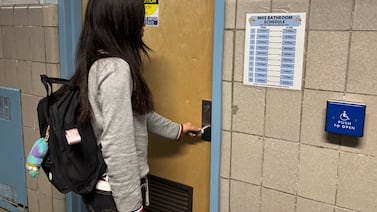Sign up for Chalkbeat Philadelphia’s free newsletter to keep up with news on the city’s public school system.
Pennsylvania Republicans plan to hold a hearing about purported “waste, fraud, and abuse” in the School District of Philadelphia, but made no specific allegations in their announcement.
Meanwhile, district leaders say they’ve been responsible with taxpayer money.
State Rep. Martina White, who represents parts of Philadelphia, issued a notice this week that on May 19, the House Republican Policy Committee will be hosting a hearing aimed at investigating the district and “uncovering solutions that prioritize the success of our children.”
White is also urging people to report any “mismanagement, waste, or abuse” within the district as well as any “ideas to improve schools, reduce inefficiencies, or enhance student outcomes,” via a website titled: “School District of Philadelphia Oversight.”
The issue of government waste and inefficiency has received unprecedented attention recently, due in large part to the Trump administration’s U.S. DOGE Service led by Elon Musk. The Trump administration, Musk, and DOGE — which stands for Department of Government Efficiency — have cited waste, fraud, and abuse to justify cutting programs for students with disabilities, teacher training grants, and the entire Philly division of the U.S. Department of Education’s Office for Civil Rights. But what exactly that phrase entails is the subject of intense dispute.
“Over the years, parents, students, educators, and community members have witnessed or experienced firsthand the challenges within the School District of Philadelphia,” wrote White, who did not mention DOGE in an April email obtained by Chalkbeat. “From waste and mismanagement of resources to fraud and systemic abuse, these issues have not only hindered progress but have also led many families to seek alternatives for their children’s education.”
Superintendent Tony Watlington has said repeatedly that the district under his leadership has been a “good steward” of state and city funding. Watlington’s refrain this year has been that student attendance is up, the four-year graduation rate is up, the dropout rate is down, the district’s credit rating has improved, and some standardized test scores are improving.
Still, Watlington told reporters at a recent budget briefing that due to decades of court-determined underfunding and the end of pandemic relief aid, the district is facing a growing annual deficit. Philly schools are also undergoing a facilities “rightsizing” process that the school board has warned will likely result in some school closures, colocations, or repurposing.
A spokesperson for the Philly school district said Friday that Watlington and other district leaders would respond “in a timely manner” if state lawmakers reach out to them about the hearing.
White has previously been critical of the district’s handling of overcrowding in the Northeast section of the city. She has also pushed for spending increases for school choice programs in the state.
Some progressive advocates have questioned the district’s spending on outside contractors in recent years. And city lawmakers have pushed the district for more transparency around the costs associated with the district’s teacher discipline process. Many charter school advocates have also alleged the district’s charter school approval process is inefficient and flawed.
White’s office said she was unavailable for comment Friday.
Carly Sitrin is the bureau chief for Chalkbeat Philadelphia. Contact Carly at csitrin@chalkbeat.org.





